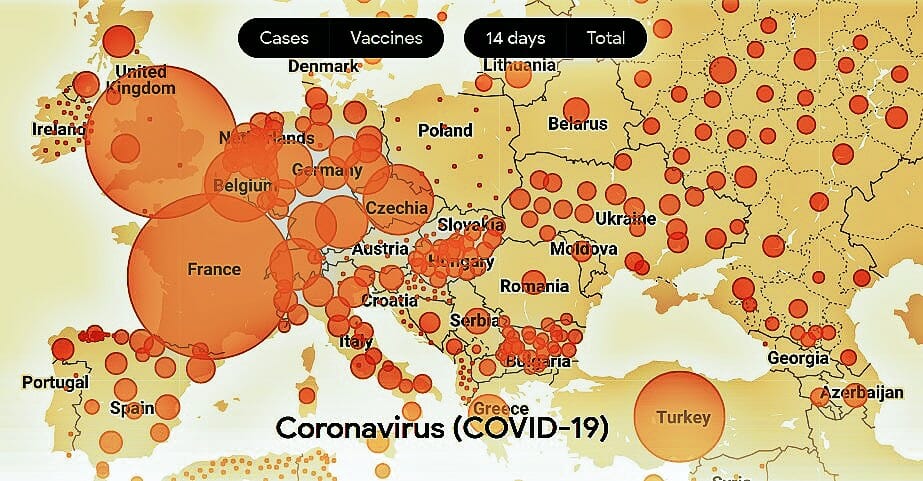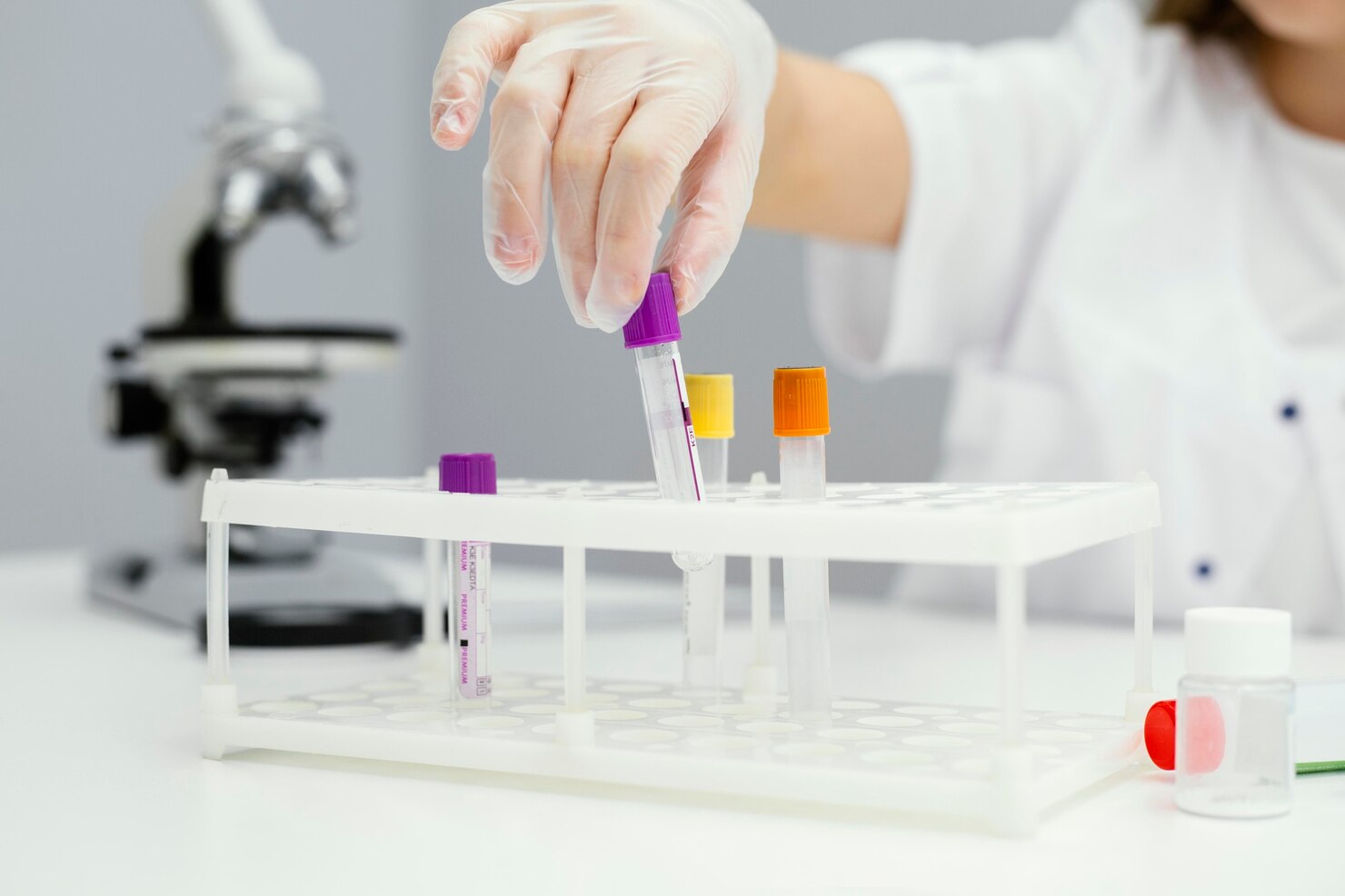Updated Dec.15, 2021. American scientists disagree with German experts who have called for a specific fourth shot against Omicron. Today, Dr. Anthony S. Fauci said booster doses of both the Moderna and Pfizer-BioNTech coronavirus vaccines are likely to offer a substantial increase in protection against Omicron, adding that “at this point, there is no need for a very specific booster” designed especially to fight it.
At the same time, Dr. Andrea Ammon, director of the European Centre for Disease Prevention and Control warned that vaccination alone will not prevent the Omicron variant from spreading, saying “a further, rapid increase in Omicron cases is imminent” in the European Union and the European Economic Area. Both she and WHO Director-General Tedros Adhanom Ghebreyesus called for countries to take urgent “strong action” to reduce transmission and alleviate the burden on health care systems.
Obligatory vaccination is causing anti-vaxxers protests across Europe, nowhere more so than in the UK. The alert level was raised to 4, the second-highest level, and the so-called “Covid Christmas hangover” could well last into 2022.
Prime Minister Johnson issued a stark message on Sunday, warning the UK would be hit by a “tidal wave” fueled by Omicron, as the case numbers are doubling every two or three days. British scientists warned that the Omicron variant could overtake Delta by mid-December. Johnson stressed the need for a booster jab, warning that hospital services could be overwhelmed. The government aims to offer booster shots to everyone eligible — adults over 18 for whom three months has elapsed since their second shots — by January 1. A total of 42 military planning units will be deployed to help with the effort.
Meanwhile, Germany has recorded over 100,000 deaths since the start of the pandemic, despite having reportedly “navigated the pandemic better than most countries” according to a new study of 29 industrialized countries by the Bertelsmann Foundation, placing Germany, along with Sweden and New Zealand, at the top of countries where the rule of law was maintained. Last week, Germany placed new restrictions on the unvaccinated and required all medical staff to be vaccinated against Covid. And Germany’s doctors’ association chief said Germans will likely need a fourth booster vaccine by the fall of next year, to maintain protection from Covid.
The situation in France is no different, with the “sixth Covid wave fuelled by Omicron” expected to hit in January 2022 while the country is still in the midst of the current, Delta-fuelled, fifth wave, according to a leading French hospital executive, Martin Hirsch, head of Paris’s AP-HP hospitals’ group, Europe’s largest hospital system.
As to Italy, this is a country that has survived the current wave rather well after being the first European country to go under at the start of the pandemic. Since this summer, a nationwide health pass system is in place. Rules were tightened under a government decree on December 6th, establishing a so-called ‘super’ green pass based on vaccination or recovery that is required for entry to cultural and leisure venues including indoor bars and restaurants, as well as for access to long-distance public transport. But it is reported today that another update is on the way this week bringing further changes, this time with the objective of suspending the green pass for anyone who tests positive for Covid – essentially enforcing isolation. This is necessary since to date, green passes remain valid even if the holder, in the meantime, has tested positive.

As the map above clearly shows, the situation in Austria that had gone into lockdown last month has improved and it is now coming out of lockdown. Reports are that the current Covid wave may even be plateauing in several European countries, and not just Austria.
Is Omicron really fuelling the Delta variant?
Updates from the European Centre for Disease Prevention and Control (ECDC.Eu) are relatively optimistic. As of 12 December and since 11 December 2021, just 34 additional Omicron cases have been confirmed in the European Union and European Economic Area (EU/EEA), contributing to an overall total of 766 confirmed cases so far. Still modest numbers.
The countries affected are as follows: Austria (17), Belgium (30), Croatia (3), Cyprus (3), Czechia (5), Denmark (195), Estonia (15), Finland (20), France (59), Germany (82), Greece (3), Iceland (20), Ireland (6), Italy (13), Latvia (5), Liechtenstein (1), the Netherlands (62), Norway (109), Portugal (49), Romania (7), Slovakia (3) Spain (36), and Sweden (23), according to information from public sources. One new country (Slovakia) has reported SARS-CoV-2 Omicron variant of concern (VOC) cases since yesterday, and in addition, a number of probable cases are reported in several countries.
Although cases reported initially were linked to travel, an increasing number of cases are now reported to be acquired within Europe. Let’s note in passing that the early reaction against South Africa appears rather unfounded: South Africa was the place where Omicron was first identified, and this thanks to the excellent work of South African researchers – but it didn’t mean that was the country where it first emerged. Countries reporting cases without an epidemiological link to travel outside the continent include Belgium, Denmark, Finland, Spain, Sweden, Latvia, and Iceland. This, as the ECDC says, indicates that undetected community transmission could be ongoing within Europe.
So this is clearly early days. But how worried should we be?
The ECDC is reassuring: “All cases for which there is available information on severity were either asymptomatic or mild. There have been no Omicron-related deaths reported thus far.” But it warns, “These figures should be assessed with caution, as the number of confirmed cases is too low to understand if the disease clinical spectrum of Omicron differs from that of previously detected variants.” For researchers, a summary of available studies on the neutralising capacity of antibodies from convalescent or post-vaccination sera against the Omicron variant virus is available in the Epidemiological Update of December 10.
However, a study published by British government scientists on Friday made headlines, warning of Omicron’s speed and noting the need for booster shots: Dubbed as “the first real-world study of how vaccines hold up against the Omicron variant”, it indicated that third vaccine doses provided considerable defense against Omicron, though there was a significant drop in protection after only two doses.
This is also something German scientists agree with: BioNTech founder, Ugur Sahin, says a 4th dose specific for Omicron is very likely to be needed.
Two American scientists, Jesse Bloom and Sarah Cobey, have just provided some further insights into Omicron and what we might expect in an essay published December 12 in the New York Times. Dr. Bloom works in a lab at Fred Hutchinson Cancer Research Center in Seattle, using a mix of experiments and computation to study the evolution of viruses such as SARS-CoV-2; and Dr. Cobey runs a computational group at the University of Chicago that investigates the interaction of immunity, viral evolution and transmission. They attempted to answer the three major questions regarding Omicron:
- Is Omicron more contagious than Delta? They noted that it spreads faster than Delta, causing an increasing number of cases in many countries, affecting especially those with no immunity, but even infecting people with prior immunity gained from either being vaccinated or having previously suffered from Covid; but how it will work out will depend on how large each group is and how people interact and therefore more time is needed to come to a final estimation;
- How well can Omicron dodge the antibodies we have from vaccines and prior infections? Omicron has so many mutations that it could dodge them quite well: Lab experiments have already shown that Omicron has mutations that reduce the infection-blocking ability of antibodies to about one-fortieth of their effectiveness against an earlier version of the virus; a study from South Africa found a higher rate of people getting infected a second time with Omicron than with previous waves caused by the Beta and Delta variants; Omicron has also caused some mild to moderate infections in individuals who were both vaccinated and had received a booster shot; and of course, there is that British report that estimates that vaccine effectiveness against disease with symptoms is lower against Omicron than against Delta – hence the need for eventual Omicron-specific boosters;
- Will the immunity we have still protect us against severe disease? Early reports about vaccinated people having only mild symptoms are however only anecdotal and it takes time to assess exactly how lethal a Covid variant might be: This is a disease that takes typically several weeks to develop to a dangerous level – hence data about the number of deaths and hospitalizations are what scientists call a “lagging indicator” – in short, we cannot know yet.
One thing is certain, Omicron is spreading around the world, and it has now reached India:
So what could happen? If it spreads widely, Omicron could still send a lot of people into hospitals even if it were less lethal than, say, Delta. As the authors of the essay say, “We also don’t yet understand the long-term health consequences of having Covid-19, and it will take weeks to understand how Omicron affects groups of people with different levels of immunity.”
On the positive side, they note “The measures that control the spread of other variants are also expected to help against Omicron.” In other words, keep doing what you’ve been doing all along: vaccinate, test, ensure proper indoor ventilation, use masks, and (alas) isolate when infected. As the authors conclude with typical American optimism: “strike a balance between reducing risk while still enjoying [your] lives”.
Editor’s Note: The opinions expressed here by Impakter.com columnists are their own, not those of Impakter.com. — Featured Photo. Omicron deconstructed, screenshot from DW video: What we know about the Omicron variant so far Dec 10, 2021









